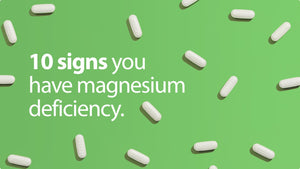Did you know that your lack of magnesium might be what's causing your facial bloat?
Thomas DeLauer breaks down the Top 3 Foods that cause bloating, and how to avoid this on the latest #ScienceSaturday
Make sure you're meeting the RDI 400mg of Magnesium everyday with Jigsaw's MagSRT® – America's #1 Time-Release Magnesium.
Transcript by Rev.com
- Did you know that your lack of magnesium might be what's causing your facial bloat? I know that's a pretty profound statement, but there's some serious truth to it. We need to make sure that we're keeping our magnesium, keeping our potassium, and keeping our sodium in balance, and when it comes down to minerals, you know me. As Mr. Mineral, I'm always bringing you the facts. So today, I am talking about facial bloat and stomach bloat, the two different kinds of bloat that we can address to make sure that we feel our best and compete-perform whenever we need to. So, I'm gonna get into the science of what's gonna cause your facial bloat and what's gonna cause abdominal bloat, alright?
-So, first off, let's talk about facial bloat. How many times have you woke up in the morning, and you look in the mirror, and you say, "What the heck? "I feel totally moon-faced." Like, you just don't even look the same that you normally do. And I'm not being totally self-absorbed when I say this, but I'm on camera a lot, and if I look in the mirror, and I see facial bloat, it kind of throws off my day. I don't exactly like the way that I look, and I think I speak for a lot of people when I say that you probably feel the same way. Well, it has to do more so than anything with dehydration, and it affects your face simply because we generally tend to retain water in our face first before anywhere else, and more than anything, it has to do with the fact that we're dehydrated in the morning, okay? So, when we get up, we've been laying down, and gravity, of course, is pulling water and pulling blood into our face. It's also known as edema. It's pretty simple, right? But it goes a little bit deeper than that. You see, when you start to get dehydrated, at the very beginning of dehydration is when you are gonna see the most facial bloat. As you get more and more dehydrated, the facial bloat actually goes away. You see, the facial bloat is sort of a last resort for your body to try to hold onto water. A lot of people don't realize that when you get dehydrated, your body holds onto water. That's the whole idea. Normally, your kidneys are excreting all of your minerals and excreting all of the water that you're consuming, or not all of it, but most of it, as you're bringing more in. But if you're not bringing enough water in, and you're not excreting it, and your kidneys aren't working, they communicate with your brain to try to hold onto water in order to preserve it. It just so happens that the face is the first place that we see that. So, what I'm trying to say here is that let your face be sort of a litmus test for the fact that you're on your way to getting more dehydrated. Some people just let it go so much further past that, that eventually the facial bloat goes away, but they're actually even more dehydrated. So, all that it really means when your face is super bloated is that you're in the early stages of dehydration.
-But there's another reason that this can happen as well, and it has to do with way too much what I call unopposed sodium. Unopposed sodium is not just having high amounts of salt. I made it pretty clear in a lot of my videos that salt is not the enemy, okay? What is the enemy is pure, absolute unopposed sodium, which means things like iodized salt that don't have other minerals to balance it out. You see, sodium needs potassium. Sodium needs magnesium to balance it out because sodium is what is known as something that is osmotic, okay? Now, this osmotic substance means that it's gonna draw water in. So, if you have high amounts of sodium and low amounts of water, like you're already starting to be dehydrated, what little water is left is gonna get drawn into the bloodstream and drawn into your capillaries and a lot of times make you puffy. So, how do you counteract this? Well, step one is using a balanced salt, okay? Using something like truffle salt, using something like pink Himalayan salt, or using something like Brazilian sea salt. Although if you saw the recent article, you're probably finding now that even sea salt is contaminated with a lot of plastics. So, truffle salt or Himalayan salt is gonna be the way to go. The other thing that you're gonna want to do first thing when you start to see a little bit of facial bloat coming on is consume some cream of tartar just because it contains a high amount of potassium, super high amount of potassium. It's a by-product of wine-making, and it's very, very easy to add just to a little bit of water, and you barely taste it. You're gonna get about 475 milligrams of potassium in just a teaspoon of that, and that's gonna help balance out that unopposed sodium.
-But again, once you start consuming the right kind of sodium, you're gonna be just fine. And here's a general rule of thumb that I want you to follow for how much sodium you should have per how much water you should have. I generally recommend consuming about a teaspoon of quality salt for every three-quarters of a gallon to one gallon of water that you consume, depending on how active you are. Your body is first going to excrete a lot of the other minerals before it excretes sodium. Your body's gonna hold onto sodium pretty darn rampantly. Okay, so now we've addressed facial bloat. Now, don't get me wrong. There's a lot of other things that can attribute to facial bloat, but this is the most common.
-Now, let's talk about stomach bloat because it's two completely different things. Stomach bloat is usually caused from something digestive or something gastrointestinal-related. And most of the time, it has to do with the poor breakdown of certain foods, particularly what are known as FODMAP food. And it stands for fermentable, oligosaccharides, disaccharides, monosaccharides, and polyols. Basically, what that means is different kinds of sugars that don't break down well, and of course, sugar alcohols like polyols that don't break down well. What happens is they don't digest in your system. They basically go into your colon, and they ferment, and they create a bunch of gas, like hydrogen and methane, that's gonna make you feel bloated and make you distended. It may not make you puffy, but it's gonna make you feel totally, totally like you're not fitting in your pants and like you're super bloated. Alright, so what causes this specifically, and what should you do, and what should you avoid?
-Well, first things first, even though I am a huge proponent of cruciferous veggies, you should not be consuming these raw. Raw broccoli and raw cabbage can be an absolute nightmare when it comes to stomach bloat and distension. What we wanna do is we wanna make sure that we're avoiding those when they are raw and steaming them even if it's just for a little bit of time. You see, cruciferous veggies, to begin with, are extremely fibrous, but in addition to that, they contain a sugar known as raffinose. Now, this raffinose, we actually lack the enzyme to break down. We don't have the ability to break down raffinose. So, what it does is it ends up transferring through our small intestine into our colon, and then from there, the bacteria that's in our colon tries to break it down, and it produces a ton of hydrogen, a little bit of methane, but mostly hydrogen. That's why you get super gassy whenever you have a lot of broccoli or cabbage. Cabbage is even higher in raffinose. If you ever notice, cabbage is a little bit sweeter than broccoli, and that's because of the raffinose.
-So, what do you do besides steaming it? Because steaming it, you're still gonna have the raffinose, and you might find you still get bloated. Well, I've got a quick solution for you, and even sort of a recipe that you can use to start fermenting your cruciferous veggies, fermenting your broccoli. Like maybe you've seen kimchi out there before, maybe you've seen sauerkraut. Well, what if I told you you could actually ferment your broccoli in the same way and get a lot more of the phytonutrients from the broccoli that you may not be getting from the cabbage? All you're gonna do is make a brine solution at first, okay? You're just gonna take like a half a gallon of water, maybe even a little bit less, and you're gonna put about three to six tablespoons of good quality sodium in there. I'm talking about pink Himalayan salt or truffle salt. Then, you're additionally gonna add two tablespoons of apple cider vinegar. It's gonna enhance the mineral uptake of the broccoli when you do consume it. Then, all you wanna do is you want to weight the broccoli down so it's totally submerged, and you're gonna let it sit for about 24 to 48 hours. And that's really all you need to start the fermentation process. That fermentation process breaks down the raffinose, the raffinose that our body normally can't break down. So then, you're still getting all the minerals, all the benefits of the broccoli, of the cruciferous veggies, but without the raffinose and without the fibers that are so hard to break down.
-So, by doing this, you have the perfect combination that's gonna help your facial bloat, and it's gonna help your digestive bloat, simply because you're getting the right mineral balance, the right mineral uptake, and you're predigesting your veggies. If you're looking for the best magnesium, hands down, you're gonna want to make sure that you check out Jigsaw Magnesium SRT, sustain release technology that's gonna make sure that you have that even balance of magnesium throughout the course of the day so that you never have to deal with these big rises and falls in minerals that's gonna make unpredictable facial bloat a serious issue. So, make sure that you check it out, and get your bottle now. I'll see you soon.























